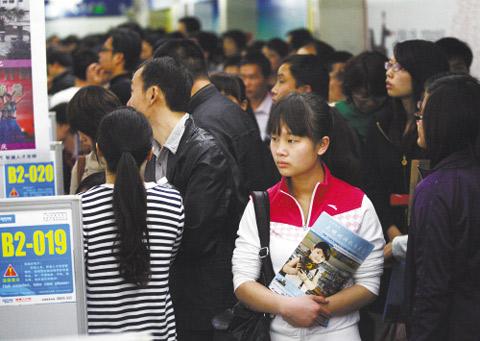
Job seekers are looking for jobs on February 26 at Chitone. (Dongguan Daily)
Employers in Dongguan are still experiencing problems in hiring staff although many of them have raised salaries, Dongguan Daily reported on February 27.
Sources with the city's job hunter Chitone said employers in the Dongguan eager to hire staff since the end of Chinese New Year, with the ratio between vacancies and job seekers reaching 1.60 - meaning one person is provided with 1.6 jobs.
But job hunters are not eager to find jobs, said an employer surnamed Tang. According to Tang, besides wage, job seekers now have more awareness about other benefits such as working conditions, dormitory conditions, weekends and holidays.
A job seeker surnamed Zhang told reporters that he was looking forward a job opportunity with better personal development future, high pays and generous benefits. He said he was not so eager to find a job.
According to Ms Wang Qian, a consultant at Chitone, job seekers, especially the younger generation, are now more confident to voice their demands because of the abundant job opportunities. Job seekers now will make more comparisons until they find the best job opportunities in their mind, so it will be longer for the employers to hire enough staff.
Other traditionally prosperous regions, like the Yangtze and the Pearl River deltas, are also experiencing labor shortages after the holidays, according to a report of Xinhua News Agencies on February 21.
In Guangdong, more than one million workers are needed, which counts for about five percent of the total number of laborers in the province, said Ou Zhenzhi, head of the human resources and social security department of the Guangdong provincial government.
In the past, the prosperous eastern part of China could create lucrative jobs for migrant workers, but now, the economic level in Southwest China's Sichuan province and Chongqing municipality, as well as in North China's Hebei province and Tianjin municipality, rose dramatically, diverting a large number of migrant workers.





